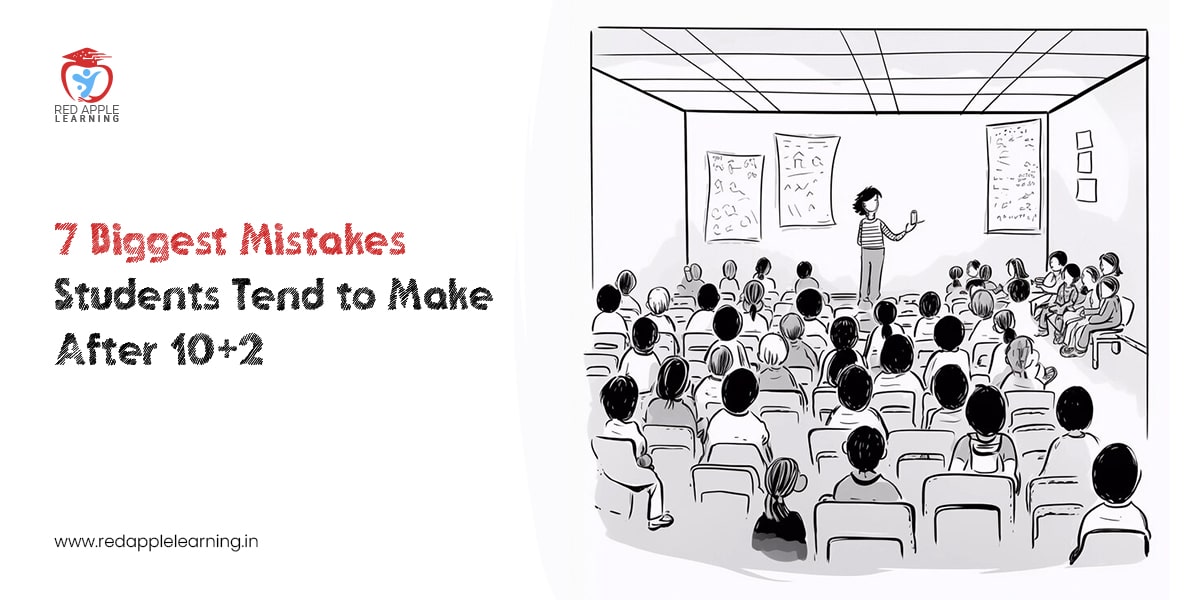7 Biggest Mistakes Students Tend to Make After 10+2

Ah, the post 10+2 phase! It is like reaching a big intersection where every road looks both exciting as well as scary. It is when life after school begins, and suddenly, you have to decide what you want to do next. For students, this moment isn’t just about picking a course; it’s about shaping a future full of opportunities. But in the midst of all the excitement, there are lots of ways you can make mistakes. So, in this blog we will be focusing on the 7 mistakes which students tend to make after 10+2.
Mistake 1: Succumbing to Peer Pressure
Picture this: a group of friends gathered around, each sharing their grand career aspirations. It’s quite easy to get swept away by the fervor of their dreams, even if they don’t align with your own. Studies show that 90% of students admit to being influenced by peer pressure when making career choices. But remember, your journey is uniquely yours. Embrace your individuality, and let your passion, interest and talents be your compass.

Mistake 2: Zero Self-Introspection
Without a clear understanding of your own strengths, interests, and aspirations, you become vulnerable to misleading career advice or flashy advertisements. Taking time for self-reflection is very important. What are the things that you are naturally good at? What subjects ignite your passion? What kind of work environment do you thrive in? and most importantly “Which one is not a mainstream course and can provide you placement easily?” Answering these questions will guide you towards a career path that aligns with your true self.
Mistake 3: Lack of Research
Many students rely solely on Google searches or advice from family members when choosing a career path. While these sources can offer some insight, remember that Google results are often influenced by targeted marketing campaigns, and family members may not always possess the complete picture of the current job market. Conduct thorough research, explore diverse career options, and seek guidance from career counselors or professionals in your desired field.
Mistake 4: Ego-driven blindness

Sometimes, the allure of a prestigious degree or a specific career title can cloud our judgment. While aiming high is commendable, ensure your aspirations are grounded in reality. Do you possess the necessary skills and aptitude for that particular field? For example, someone who dislikes numbers and financial concepts might struggle in an MBA program. Choose a path that aligns with your natural talents and interests, not just the perceived prestige associated with it.
Mistake 5: Inclination for Integrated Courses
Integrated courses often come with hefty price tags and promise a smooth transition from school to higher education. However, remember that in today’s skill-based economy, a degree alone isn’t enough. Focus on acquiring industry-relevant skills and practical knowledge, regardless of the program you choose. Instead of fixating on degrees, focus on acquiring tangible skills that are in demand in your chosen field. Remember, it’s not about where you study, but what you learn and obviously, how you apply it.
Mistake 6: Skill Gap and Unemployment
As per India Today, recent study has affirmed that approximately 75% of all organizations have acknowledged a fundamental skill gap in the industry, which is a major reason behind the existing unemployment rate in India. There is a pressing need for a braided pathway between education and employment. A mismatch in skills and industry requirements may lead to discontent among job seekers. Therefore, it’s imperative for students to develop the appropriate skill set not just for job hunting but for building a sustainable career. They should select a course that ensures immediate employment opportunities upon completion.

Mistake 7: Unethical Comparison
Comparing yourself to others, especially friends or relatives, can be a major pitfall. Remember, every individual is unique with their own set of strengths and weaknesses. Success cannot be copied or replicated. Comparing your journey to someone else’s is like comparing apples to oranges. Focus on your own goals, celebrate your individual achievements, and chart your own path to success.
Think About It…
By avoiding these common mistakes and prioritizing self-awareness, thorough research, and a focus on skill development, you can navigate the post-10+2 phase with confidence and make informed decisions that lead to a fulfilling and successful future. Remember, your career path is a personal journey, and the choices you make today will shape your tomorrow. Choose wisely, and chase your dreams with an open heart and a clear mind.
